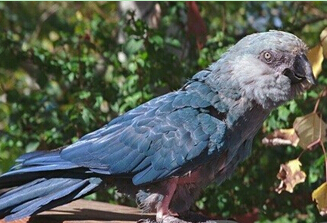
The bird was a Spix's macaw named Presley, and he was around 40 years old when he died Wednesday. He was thought to be the second-to-last of the remaining wild-born parrots.
Presley's death is a blow to conservation efforts in both a symbolic and literal sense. Critically endangered, these native Brazilian birds (Cyanopsitta spixii) are believed to be extinct in the wild. Decades of deforestation and rampant wildlife trafficking have besieged the medium-size macaws, who also ended up having to compete for nest space with introduced Africanized honeybees.
Now, the fewer than 100 remaining Spix's macaws are cloistered in captive breeding programs and refuges throughout the world—and the small population is vulnerable to genetic defects caused by inbreeding. Presley offered the opportunity to inject some much-needed genetic diversity into the population.
But he left no offspring.
There are reports that Presley himself influenced the 2011 movie Rio, an animated film that tells the tale of a lone male Spix's macaw. Found living in the United States, the bird, named Blu, is initially unable to fly. But he returns to Brazil and finds the only other known surviving member of his species, a female named Jewel. Together, the two movie macaws battle wildlife traffickers and eventually start a small family.
Director Carlos Saldanha has said he hoped the movie would raise awareness of the challenges facing endangered birds in Brazil. "I wanted [to feature] the rarest bird," he told the website Bird Channel in 2011. "The Spix's macaw truly is the rarest."
Released this year, an optimistic sequel, Rio 2, follows Blu and Jewel as they encounter a hidden population of Spix's macaws in the Brazilian Amazon.












